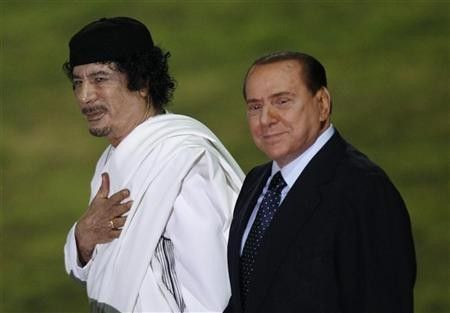Libya: Berlusconi Backs Rebel Government, Finally
Berlusconi Invites Rebel Leader to Italy

Italy's Prime Minister Silvio Berlusconi has already thrown his support behind the Libyan rebel government, just one day after anti-Gadhafi forces took the capital city of Tripoli.
On Monday, Berlusconi, who was a long-time ally and friend of Moammar Gadhafi, invited rebel leader Mahmoud Jibril to Italy, hoping that Jibril will visit the country sometime this week. The two leaders spoke on the phone, and agreed to meet in the next few days.
Berlusconi's eagerness to speak with the National Transitional Council is a further sign that the West is more-than ready to accept the rebel government in Libya. Yet, Berlusconi's intentions go beyond diplomacy, and the Italian P.M., as always, has domestic economics in mind. Italy purchases about 80 percent of Libya's oil, a fact that made Gadhafi a good friend of Berlusconi's cabinet.
Earlier Monday, Berlusconi urged Gadhafi to come out of hiding and to surrender for the good of Libya.
We ask Colonel Gaddafi to stop all useless resistance so as to save his people from further suffering, Berlusconi said in a statement.
Yet, he also stated that he hopes the rebel government will avoid any revenge fantasies concerning Gadhafi, and will focus its attention on rebuilding the country.
The relationship between Berlusconi and Gadhafi was long, and at some points, strange. Colonel Gadhafi went on 11 state visits to Rome in recent years, and during one trip, Gadhafi gave a lecture on Islam to a convention populated by Italian women hired from a modeling agency.
The two leaders have much in common. Aside from power and money, both have a love of beautiful women. Gadhafi famously has his retinue of all-female bodyguards, while Berlusconi was scandalized over a veritable-stable of belle donne he was supposedly sleeping with, some of whom he gave jobs in his media companies and his government.
In the first months of the conflict, Italy pushed for negotiations between the Libyan government and rebels, but both sides, along with NATO, resisted. Italy was reluctant to begin a bombing campaign against pro-Gadhafi forces, but relented in April.
Nonetheless, the Italian P.M. was convinced in May that he alone could convince [Gadhafi] to go into exile, and he offered to go to Tripoli to discuss a transition plan with his old friend.
I'm saddened for Gadhafi and I'm sorry. What's happening in Libya hits me personally, Berlusconi said earlier this summer.
But in July, Gadhafi's cabinet said they were banning Italian energy company Eni from Libya. About 15 percent of Italy's oil comes from Libya, and before the civil war, Eni produced about 17 percent of Libya's daily barrel output. Libya considered selling Eni's contract to Russia and China, but that prospect has dried up.
Since the Libyan conflict started, oil production has slowed to a halt.
Libya said that Italy's involvement in NATO operations led them to cancel the Eni contract, signaling that the final chapter in the long standing partnership between Italy and its former colony is coming to an end.
© Copyright IBTimes 2025. All rights reserved.





















